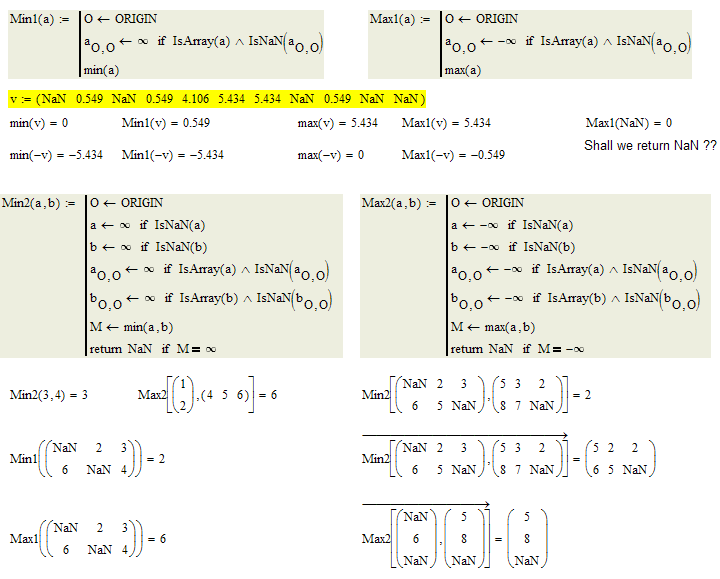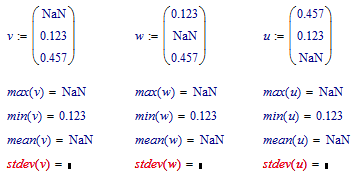Community Tip - New to the community? Learn how to post a question and get help from PTC and industry experts! X
- Subscribe to RSS Feed
- Mark Topic as New
- Mark Topic as Read
- Float this Topic for Current User
- Bookmark
- Subscribe
- Mute
- Printer Friendly Page
max( ) works and min( ) doesn't ?
- Mark as New
- Bookmark
- Subscribe
- Mute
- Subscribe to RSS Feed
- Permalink
- Notify Moderator
max( ) works and min( ) doesn't ?
Hello, Everyone.
From :
So the question is : Is there a reason for : " max( ) works and min( ) doesn't " ?
Thanks in advance for your time and help.
Best Regards.
Solved! Go to Solution.
- Labels:
-
Other
Accepted Solutions
- Mark as New
- Bookmark
- Subscribe
- Mute
- Subscribe to RSS Feed
- Permalink
- Notify Moderator
Ah, I did not realize that it depends on the first item in the vector.
Anyway, that behaviour sure is not as it should be and we may call it a bug.
But I am not sure how I would like min or max to behave. Normally in Mathcad, whenever a calculation encounters a NaN, it returns NaN as result. So for consistency min and max should return NaN in the examples above. On the other hand I guess it would not do any harm and would be convenient if those functions would simply ignore the NaN's - just like my filterNaN workaround.
Based on your information we can provide another workaround by simply putting + or - infinity at the front. But both workarounds will only work for vectors and must be modified slightly differently for row and column vectors.

- Mark as New
- Bookmark
- Subscribe
- Mute
- Subscribe to RSS Feed
- Permalink
- Notify Moderator
Both, max and min, work OK the same way. NaN simply is interpreted as zero.
You may use filterNaN to get what you expect:

- Mark as New
- Bookmark
- Subscribe
- Mute
- Subscribe to RSS Feed
- Permalink
- Notify Moderator
min works as expected as long as the first item in the vector is not NaN. Also works ok if the first item is NaN and the minimum is less than zero.
max has the same problem if all the terms, other than NaN, are negative.
Alan
- Mark as New
- Bookmark
- Subscribe
- Mute
- Subscribe to RSS Feed
- Permalink
- Notify Moderator
Ah, I did not realize that it depends on the first item in the vector.
Anyway, that behaviour sure is not as it should be and we may call it a bug.
But I am not sure how I would like min or max to behave. Normally in Mathcad, whenever a calculation encounters a NaN, it returns NaN as result. So for consistency min and max should return NaN in the examples above. On the other hand I guess it would not do any harm and would be convenient if those functions would simply ignore the NaN's - just like my filterNaN workaround.
Based on your information we can provide another workaround by simply putting + or - infinity at the front. But both workarounds will only work for vectors and must be modified slightly differently for row and column vectors.

- Mark as New
- Bookmark
- Subscribe
- Mute
- Subscribe to RSS Feed
- Permalink
- Notify Moderator
Many thanks, Werner and Alan. ![]()
![]()
Regards.
- Mark as New
- Bookmark
- Subscribe
- Mute
- Subscribe to RSS Feed
- Permalink
- Notify Moderator
Based on Alans observation concerning the first item in a vector here are some Min/Max replacement with one and two arguments which ignore NaN's and also can be used vectorized.

- Mark as New
- Bookmark
- Subscribe
- Mute
- Subscribe to RSS Feed
- Permalink
- Notify Moderator
For what it's worth: Mathcad 11.

The error message for stdev is: "Encountered a floating point error.".
Luc
- Mark as New
- Bookmark
- Subscribe
- Mute
- Subscribe to RSS Feed
- Permalink
- Notify Moderator
Thanks - so it was still not as consequent as we would like it to be, but at least the outcome did not depend on the first item of the vector.
BTW, in Mathcad 15 stdev returns NaN, which I consider a better way to deal with the NaN in the vector.


